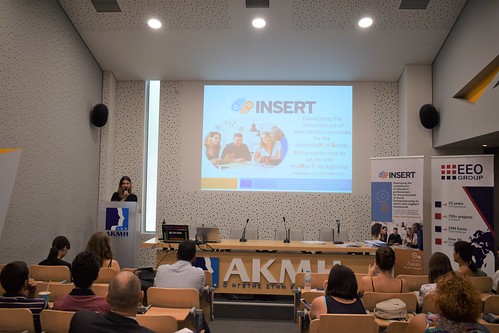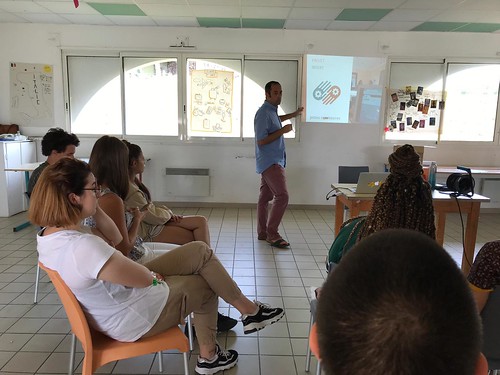
With social entrepreneurship at the heart of their project, Point Europa helped adult educators to support migrants in setting up their own social enterprises.
Based in Cornwall, the organisation coordinated the INSERT project with a €202,304 grant from Erasmus+. Throughout Point Europa’s history, it has worked with the disadvantaged, including migrant groups.
Michelle Maunder, project coordinator, said: “We discovered there were migrants who would come over and look for employment, but they had so many skills and talents.
“We wanted to encourage them to set up their own social enterprises so they could then become part of the communities they live in, but also employ themselves.”
The team spoke with social entrepreneurship professionals to gain insights for their project, identifying a lack of awareness in social entrepreneurship creation.
“For those that work with migrants, it’s more about helping them to find employment or helping them to settle in a community. But it wasn’t necessarily about giving migrants the tools and resources to settle in a county and then start up a business themselves,” said Michelle.
The organisation also found there was limited knowledge about social enterprise among migrants.
“A lot of them didn’t understand the concept and thought it was just about helping your community. Although you need a social impact with your business, it is still business that needs to make money and should be sustainable.”
After speaking with various organisations across Europe, Point Europa launched the INSERT project with partners from France, Greece, Italy and Austria.
Sustainable filtering effect
The goal was to develop an informal network of ‘social learning e-centres’ for educators, trainers and professionals. A free, online course was created to deliver clear information about social entrepreneurship for those who work with adult migrants.
The primary target group consisted of adult educators and trainers, where partners followed a robust procedure in selecting participants. This would include requiring potential partners to write a CV of their background and explain why they wanted to take part in the course.
“Each of the partners know their target group, where they are and their particular situations,” said Michelle. “We decided to let them find the right people, because it’s not just taking part in the training. We also wanted to have a filtering effect.”

This sustainable filtering effect was a vital aspect of the project; where the selected participants could go on to train their peers, using the same course and spread the knowledge and ideas they gained.
During its creation, some aspects were altered to ensure they kept the focus on the participants and the intended filtering effect.
“Sometimes you have the vision of the project, but then you start working on it and you can risk losing the focus of the participants, such as what’s needed. Things then have to adapt and change for it to be beneficial for the target group,” Michelle explained.
A handbook was also developed, designed as a reference point for organisations and explaining how they can develop the social entrepreneur competences of educators working with migrant adults.
Creating long-term impact
The project saw 50 participants successfully complete the course. In feedback, they found that 86% of the trainees were interested in finding and engaging new peers to be educated in the project, ensuring its sustainable filtering effect.
Through all the activities that took place, the project benefitted 700 participants and has seen more than 50 new peers engaged and trained by selected educators.
I think that’s one of the fantastic things about these projects; coming together with organisations to talk about their work, reflecting on your own practice and sharing best practice with each other.
In terms of impact, the partnership planned for this to be felt on a long-term basis, where the course would still be delivered in years to come.
Michelle added: “As a partnership, we felt when we finished the project that it is something that is relevant all the time, where it would be used and shared continuously.”
Many of the partners were seeing the project’s impact.
Austrian partner, the BEST Institute, stated: “The INSERT project has seen many groups, and those working with migrants, develop new skills and more importantly confidence. They’re sharing their knowledge, not only with professionals, but directly with migrants.”

Many of the community-based organisations which took part had not previously worked with migrants.
“It was a good opportunity for them to focus on a different sector of the community and see how they could use the project to work more with that sector,” said Michelle. “The project has helped all the partners to identify and support another need in the community.
“I think that’s one of the fantastic things about these projects; coming together with organisations to talk about their work, reflecting on your own practice and sharing best practice with each other.”
Enjoyed reading about Point Europe’s experiences? Discover more of our Erasmus+ adult education stories!
